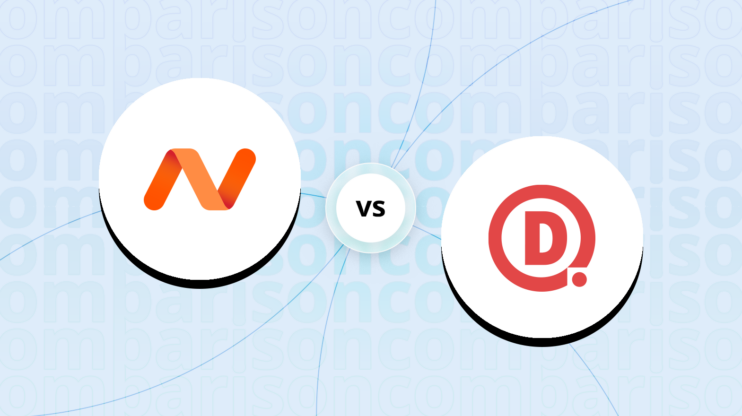Siteground vs Liquid Web: Final verdict
Looking over SiteGround vs. Liquid Web, it’s clear why both hosts are so popular. They have both hosted millions of
websites that run on WordPress for decades, building up a loyal customer base.
-
Liquid Web (Overall grade: 8.4)
excels in offering enterprise-level and highly compliant hosting solutions like VPS and dedicated servers, making it suitable for more complex needs and high-traffic websites. The platform ensures top-tier availability with a 100% uptime guarantee and 10x credit for any downtime. Liquid Web’s customer support, known for quick response times and dedicated teams, further enhances its reputation. However, the lack of certain free services like a CDN and SSL, which SiteGround offers, and some mixed user feedback on long-term service quality may be drawbacks. Liquid Web remains a solid choice for businesses needing advanced and highly reliable hosting options.
SiteGround (Overall grade: 8.8)
offers a strong array of features across various hosting plans, including shared, WordPress, and cloud hosting. Users benefit from excellent uptime, fast response times, and integrated speed technologies that enhance website performance. SiteGround’s extensive customer support options, including live chat, phone support, and a robust helpdesk, ensure users can quickly resolve issues. However, some users have noted higher renewal costs and occasional support navigation difficulties. SiteGround’s user-friendly tools and strong support make it particularly attractive for beginners and small businesses.
 Overall grade:8.8 |
 Overall grade:8.4 |
|
|---|---|---|
| Uptime and Availability | 9.4 | 9.2 |
| Hosting Performance | 8.8 | 7.7 |
| Hosting Security | 8.6 | 9.3 |
| Price | 8.4 | 8.0 |
| Hosting Features | 8.5 | 6.4 |
| Ease Of Setup | 8.9 | 8.7 |
| User Management | 8.4 | 8.3 |
| Customer Support | 9.2 | 9.4 |
| User feedback | 4.3/5 | 4.3/5 |
Hosting types offered
Both platforms provide a variety of hosting types, each designed to meet the different needs of users.
 |
 |
|
|---|---|---|
| Shared hosting | ||
| Cloud hosting | ||
| WordPress hosting | ||
| Ecommerce hosting | ||
| VPS hosting | ||
| Dedicated hosting |
Although both offer a variety of hosting plans tailored to different needs, in
certain cases, one platform may prove to be more suitable.
Detailed comparison
Uptime and availability
Evaluates the average uptime statistics, uptime guarantee and overall availability of the hosting
provider
Score Components:
- Uptime percentage (30%): evaluates the uptime statistics in given period of time
- Uptime guarantee (20%): Assesses if the platform offers an uptime guarantee and
whether the actual uptime matches the promised guarantee. - General performance (25%): Evaluates how fast is the average response time and overall
it’s stability. - Responsiveness (10%): Adaptability to different devices and screen sizes.
- Availability (25%): Reflects the total downtime and number of outages.
 9.4
9.4
 9.2
9.2
🏆 Winner
SiteGround: Great uptime and availability along with fast customer support.

With a network uptime guarantee of 99.9%, SiteGround ensures customers experience minimal downtime. Over nearly two months, they recorded only three outages totaling seven minutes, yielding an impressive 99.99% average uptime. SiteGround also stands out with rapid response times, averaging 0.207 seconds, and adequate compensation if uptime drops below the guaranteed mark.

Liquid Web offers a 100% uptime guarantee and a 10x credit for any downtime, ensuring top-tier availability. They employ proactive Sonar™ Monitoring and guarantee hardware component replacement within 30 minutes. Their support promises initial responses in 59 seconds for phone and chat, and 59 minutes for helpdesk tickets. This setup makes Liquid Web highly reliable but falls just short of SiteGround’s performance in monitored tests.
Which one has better hosting performance?
Score Components:
- Hosting speed (30%): This includes SSD quality, Load times, PageSpeed score ranges,
additional information on website speed, built-in plugins for performance enhancement, available caching
methods, and CPU/RAM options - CDN (20%): Considers whether CDN is available or not, whether it’s free or paid, and
the quality of the CDN service - Available data centers (30%): Evaluates the number of data centers and their locations
globally. - Scalibility (20%): Looks at whether elastic scaling is available, the process required
to scale (manual upgrade vs. automatic scaling), the presence of dedicated servers, and the costs
associated with scaling.
 8.8
8.8
 7.7
7.7
🏆 Winner SiteGround: For users who prioritize speed and advanced technological infrastructure, Sitrground is more suitable for high-demand websites that require reliable and fast global access.
SiteGround and Liquid Web both offer SSD storage and free CDN integration to enhance hosting performance and speed. SiteGround, however, showcases faster load times with a heavyweight theme clocked at 1.69 seconds, compared to [Example hosting one]’s 4.85 seconds. SiteGround operates 11 global data centers, which surpasses [Example hosting one]’s six, potentially offering better local loading speeds and content delivery. Moreover, SiteGround’s technology is more up-to-date, which may contribute to its superior performance.
Website Speed
SiteGround integrates cutting-edge speed technologies like Brotli, HTTP/2, TLS 1.3, and OCSP Stapling, combined with its NGINX-based dynamic cache and Memcached service, to deliver rapid website performance. The platform’s ultrafast server setup and preinstalled Speed Optimizer plugin notably reduce the TTFB, ensuring pages load 30% faster. While Liquid Web promises fast server speeds with NVMe or SSD storage and a 10 Gbps network, the absence of some automatic front-end and media optimizations, which SiteGround offers, may affect overall speed for specific web applications.
Scalability
Both SiteGround and Liquid Web offer scalable hosting solutions, but they differ in their approaches. SiteGround provides scaling through different plans like GrowBig and GoGeek, with an option to move to Cloud hosting for more substantial needs starting at $100.00/month. On the other side, Liquid Web facilitates easy scalability with limited downtime through managed VPS service upgrades and autoscaling—adjusting server resources automatically without additional costs. Liquid Web also offers dedicated servers with flexibility in scaling, but there is no clear information on pricing for scaling upgrades on these plans.
Which one has better security features?
and regulatory requirements
Score Components:
- Technical security measures (40%): This includes encryption, firewalls, DDoS
protection, secure configurations, server monitoring, access control and availability of security addons
(e.g Sitelock security). - Operational security measures (30%): Encompasses data privacy, backups and data
redundancy. - Compliance and certifications (20%): Adherence to legal and regulatory requirements
(e.g., GDPR, HIPAA) and possession of certifications (e.g., ISO 27001, SOC 2). - Business and reliability (10%): Factors in the provider’s reputation, uptime
guarantees, and customer support.
 8.6
8.6
 9.3
9.3
🏆 Winner: Liquid Web: A stellar hosting service with diverse compliance certifications and advanced security measures.
Both SiteGround and Liquid Web, have notable differences in their approaches to technical and operational
security, as well as in their compliance with regulations.
Technical security measures:
SiteGround and Liquid Web both offer a solid portfolio of technical security measures, but key differences stand out. SiteGround boasts a sophisticated AI Anti-Bot system and a smart Web Application Firewall (WAF), protecting millions of sites daily. Liquid Web counters this with a real-time DDoS attack protection and a comprehensive F5 AIP intrusion detection system. SiteGround’s daily distributed backups ensure data integrity, while Liquid Web provides server protection with hardened configurations and VPN support. Liquid Web also promises data encryption at rest and a web application firewall, compared to SiteGround’s focus on automatic updates and multi-layered security.
Operational security measures:
Round-the-clock system administration is a strength both SiteGround and Liquid Web possess. SiteGround offers automated daily backups, with up to 30 copies for user retrieval, while Liquid Web ensures business resiliency through extensive firewall and VPN protections. Although SiteGround has seamless integration with Google Cloud to enhance its multi-layered security and phishing-resistant keys, Liquid Web excels with dedicated on-site support and meticulous server protection measures. Liquid Web’s managed services reveal an edge over SiteGround, particularly in overall server security and ongoing threat management.
Compliance and certifications:
Liquid Web excels in compliance with stringent regulatory standards. It offers PCI, GDPR, and HIPAA-compliant hosting solutions, supported by detailed quarterly and on-demand scans from an approved scanning vendor. Additionally, Liquid Web’s GDPR and HIPAA compliance services include baus and HITECH certification. SiteGround offers prosperous compliance solutions but lacks PCI compliant servers and HIPAA compliance, focusing instead on proactive security measures. Liquid Web also holds SSAE-22 certifications, further solidifying its position in compliance and regulatory adherence.
 |
 |
|
|---|---|---|
SSL certificate |
Free |
Offered |
Additional security features |
AI Anti-Bot, WAF |
DDoS Protection, Intrusion Detection |
PHP versions |
Not specified |
Various versions |
GDPR compliance |
Not specified |
Yes |
HIPAA compliance |
Not specified |
Yes |
PCI compliance |
No |
Yes |
Hosting features
Score Components:
- Domains (20%): Assesses the availability of a free domain, domain purchase options, and
pricing - Email (15%): Considers if the provider offers full email hosting, or is reselling
third-party service, and if the email is only transactional or not - Website builder (15%): Checks if website builder is available, and it’s user
friendliness and overall the level of customization allowed. - Staging environment (20%): Determines if a staging environment is available, allowing
for testing changes before going live. - FTP & SFTP accounts (10%): Evaluates if and how easily users can access FTP and
SFTP accounts - Git and SSH access (20%): Assess whether Git is integrated into the hosting service and
if SSH access is provided
 8.5
8.5
 6.4
6.4
🏆 Winner
SiteGround: A robust hosting provider known for its feature-rich plans and excellent customer support.
SiteGround offers an extensive range of hosting features, covering WordPress, Reseller, and Cloud Hosting. Users benefit from tools like the free site builder, which simplifies website creation and allows for complex customization. The website builder is user-friendly, enabling beginners to get started easily, while also offering more advanced options for experienced users. Unique selling points such as free CDN service, free SSL, daily backups, and enhanced security make SiteGround a compelling choice for many. Their commitment to 100% renewable energy match and ultrafast PHP setup showcases their dedication to performance and sustainability. Pricing incentives, such as significant discounts for the initial term, add to the appeal.
Liquid Web, on the other hand, is notable for its fully managed hosting services and high availability options. They excel in providing enterprise-level solutions, with customizable and compliant hosting environments to meet specific requirements like HIPAA or PCI compliance. Features like VMware Private Cloud with transparent pricing, managed WooCommerce hosting, and robust VPS hosting emphasize their focus on complex and high-performance needs. Liquid Web’s stellar 24/7/365 customer support with guaranteed response times further enhances its value proposition. However, the lack of explicit mention of a free site builder and other free services like SiteGround’s CDN and SSL offerings might be a consideration for potential customers.
 |
 |
|
|---|---|---|
Free domain |
No |
No |
Free SSL |
Yes |
Yes |
Email hosting |
Yes |
Yes |
Website builder |
Yes |
No |
Staging environment |
Yes |
Yes |
FTP & SFTP accounts |
Yes |
Yes |
Git and SSH access |
Yes |
Yes |
Free backup |
Yes |
No |
Money back guarantee |
Yes, 30 days |
No |
a location.
As a result in rare cases the features mentioned here can differ from the ones you see on their websites.
Both providers support a range of users from beginners to experts with user-friendly website builders and WordPress staging areas. However, in terms of developer tools, both SiteGround and Liquid Web offer robust options including SSH access, support for multiple programming languages, and Git for version control, thus appealing to developers looking for advanced capabilities.
Email services:
SiteGround includes free email hosting, allowing users to set up and manage their email accounts directly within their hosting plan. This can be highly advantageous for small businesses looking to keep all services under one roof. Liquid Web also offers email hosting, but the specifics on transactional email capabilities or third-party email services like Google Workspace or Outlook are not detailed. This could mean relying on external solutions for more robust email marketing campaigns or transactional email services.
Price
Score Components:
- Plan value (40%): What each pricing tier offers.
- Transparency and clarity (30%): Clearness of pricing structures.
- Flexibility of plans (20%): Range of options to suit different budgets.
- Hidden costs (10%): Additional expenses not included in the plan.
 8.4
8.4
 8.0
8.0
🏆 Winner
SiteGround: Exceptional plans at competitive prices with comprehensive features.
Evaluating the pricing of plans among various hosting providers can be complex due to their differing pricing and renewal strategies. Additionally, certain plans require annual commitments, which adds to the difficulty of making comparisons. The prices listed are based on monthly commitments; plans requiring annual commitments are indicated. Additionally, although some providers offer identical plans for WordPress and shared hosting, we have created separate tables for each to enhance clarity.
SiteGround offers competitively priced plans with extensive features across its Web, WordPress, and Cloud hosting plans. The StartUp plan for shared hosting starts at $3.99/mo* for one website with 10 GB of web space and unmetered traffic, while Liquid Web’s lowest priced VPS Hosting plan starts at $20/mo with 2 vCPU, 2 GB RAM, and 40 GB storage. For more advanced needs, SiteGround’s GoGeek plan at $10.69/mo* covers ~400,000 monthly visits and includes priority support. Liquid Web’s high-tier plans, like its EXECUTIVE Managed WordPress Hosting at $602.00/mo after introductory pricing, offer up to 500GB storage capabilities. SiteGround’s Cloud plans begin at $100/mo excl. VAT for 4 CPU Cores and 8GB Memory, whereas Liquid Web’s features a more dedicated approach with options like the Intel Xeon E-2356G starting at $159/mo. Both providers include essential features such as free SSL and daily backups, but SiteGround offers a strong array of user-friendly enhancements like managed WordPress and free CDN.
 |
 |
|---|---|
|
StartUp Plan $17.99/mo*
1 Website, 10 GB Web Space, unmetered traffic, free WP installation, WP auto updates, daily backups, free SSL, free CDN, enhanced security, managed WordPress, 100% renewable energy match, 30-day money-back, add collaborators. Value for price:8.5
|
SPARK $21/mo
1 site, 15GB storage, 2TB bandwidth, 10 PHP workers per site, 20 autoscaled PHP workers per site, 24/7 support. Free SSL, CloudFlare CDN, essential security. Value for price:8.0
|
|
GrowBig Plan $29.99/mo*
Unlimited Websites, 20 GB Web Space, unmetered traffic, free WP installation, WP auto updates, on-demand backups, staging. Value for price:9.0
|
SPARK+ $43/mo
3 sites, 25GB storage, 2.5TB bandwidth, 15 PHP workers per site, 25 autoscaled PHP workers per site, 24/7 support. Free SSL, CloudFlare CDN, essential security. Value for price:7.5
|
|
GoGeek Plan $44.99/mo*
Unlimited Websites, 40 GB Web Space, unmetered traffic, free WP installation, WP auto updates, white-label clients, free private DNS, highest tier of resources, priority support. Value for price:9.5
|
DESIGNER $120/mo
10 sites, 60GB storage, 4TB bandwidth, 20 PHP workers per site, 30 autoscaled PHP workers per site, 24/7 support. Free SSL, CloudFlare CDN, essential security. Value for price:7.0
|
 |
 |
|---|---|
|
StartUp Plan $17.99/mo*
1 Website, 10 GB Web Space, unmetered traffic, free SSL, daily backup, free CDN, managed WordPress, 100% renewable energy match, 30-day money-back, add collaborators. Value for price:8.5
|
N/A |
|
GrowBig Plan $29.99/mo*
Unlimited Websites, 20 GB Web Space, unmetered traffic, on-demand backup copies, daily backups, enhanced security, free SSL. Value for price:9.0
|
N/A |
|
GoGeek Plan $44.99/mo*
Unlimited Websites, 40 GB Web Space, unmetered traffic, priority support, white-label clients, free private DNS, highest tier of resources. Value for price:9.5
|
N/A |
 |
 |
|---|---|
|
Jump Start Plan $100.00/mo excl. VAT
4 CPU Cores, 8GB Memory, 40GB SSD Space, 5TB Data Transfer. Value for price:8.0
|
Intel Xeon E-2356G (16 GB RAM) $159/mo
6 cores (12 threads), 3.2 GHz base (5.0 GHz turbo), 16 GB RAM, 480 GB SSD RAID-1, 10 TB bandwidth. Value for price:8.5
|
|
Business Plan $200.00/mo excl. VAT
8 CPU Cores, 12GB Memory, 80GB SSD Space, 5TB Data Transfer. Value for price:8.5
|
Intel Xeon E-2356G (32 GB RAM) $199/mo
6 cores (12 threads), 3.2 GHz base (5.0 GHz turbo), 32 GB RAM, 960 GB SSD RAID-1, 10 TB bandwidth. Value for price:9.0
|
|
Super Power Plan $400.00/mo excl. VAT
16 CPU Cores, 20GB Memory, 160GB SSD Space, 5TB Data Transfer. Value for price:9.0
|
Intel Xeon E-2356G (64 GB RAM) $249/mo
6 cores (12 threads), 2.9 GHz base (4.8 GHz turbo), 64 GB RAM, 1.92 TB SSD RAID-1, 10 TB bandwidth. Value for price:9.5
|
As a result in rare cases the prices displayed here can differ from the ones you see on their websites.
Enterprise plans
SiteGround’s enterprise options include the Super Power Cloud Hosting plan at $400.00/mo excl. VAT, offering up to 16 CPU cores and 20GB memory, with a strong focus on renewable energy. Liquid Web provides the ENTERPRISE Managed WooCommerce plan at $1095.00/mo after introductory pricing, featuring 800GB storage and handling up to 30 stores. Both providers include advanced features and 24/7 support, but SiteGround’s cost-efficient and green energy practices make it particularly appealing in the enterprise category.
Siteground vs Liquid Web: Ease of setup
platform.
Score Components:
- Site migration (25%): Assesses whether the provider offers tools for site migration,
either automated or manual, and whether these services are free or require a fee. - Admin panel usability (35%): Evaluates the type of admin panel provided, such as the
standard cPanel or a custom solution, focusing on its accessibility and user-friendliness for both
technical and non-technical users. - Setup features (20%): Examines the availability and ease of use of various setup
features, including FTP accounts, file managers, email account setup, PHPMyAdmin, and easy CDN
configuration. - Help center quality (20%): Measures the quality and accessibility of the provider’s
help center resources, including articles and tutorials.
 8.9
8.9
 8.7
8.7
🏆 Winner SiteGround: An efficient hosting service with extensive setup tools and excellent customer support.
SiteGround utilizes a custom control panel called Site Tools, designed for both technical and non-technical users. It features an intuitive interface and easily accessible functions, making common tasks like email setup and management, file transfers, and performance monitoring straightforward. Non-technical users will appreciate the streamlined experience, while advanced users can benefit from SiteGround’s more technical tools. The panel’s layout simplifies complex tasks, enabling quick access to its numerous features without requiring deep technical knowledge.
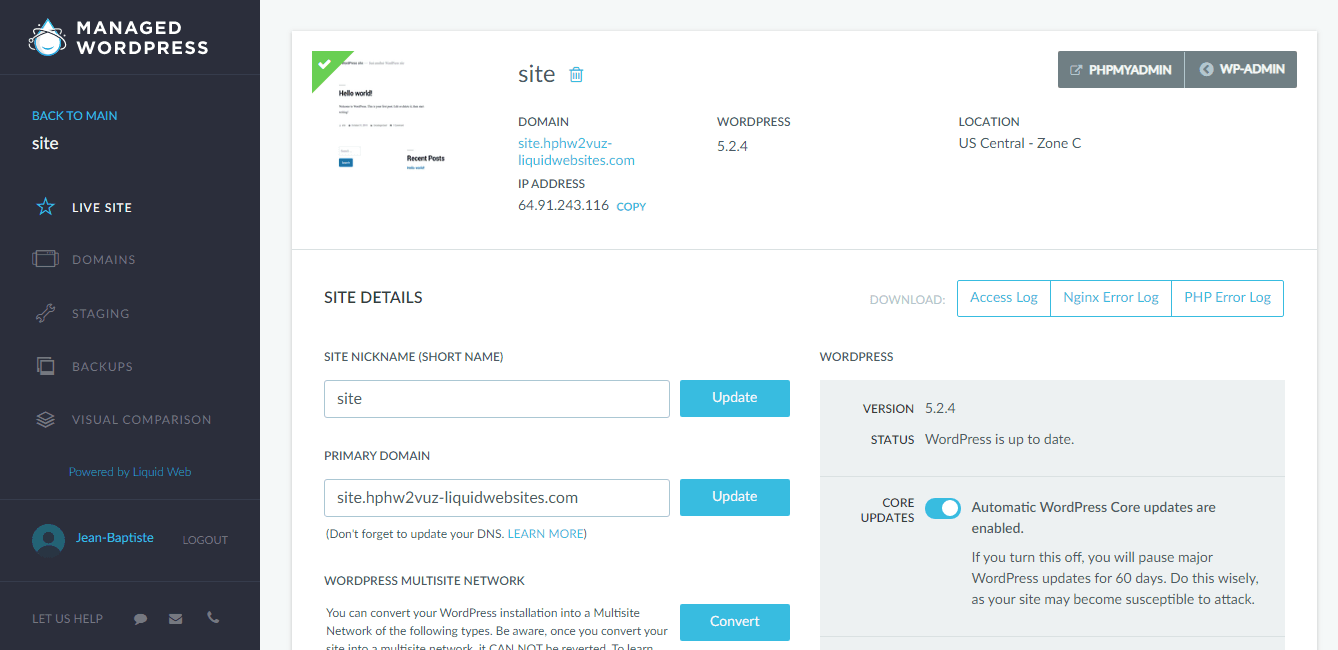
Liquid Web, on the other hand, employs a combination of standard cPanel and a more advanced custom dashboard called the Managed WordPress Portal. cPanel offers familiarity for users accustomed to traditional hosting environments, and it is generally user-friendly. Liquid Web’s Managed WordPress Portal is rich in features geared toward developers and advanced users but offers a steeper learning curve for novices. It excels in managing large, complex hosting environments, but may be less accessible for beginners compared to SiteGround’s more streamlined panel.
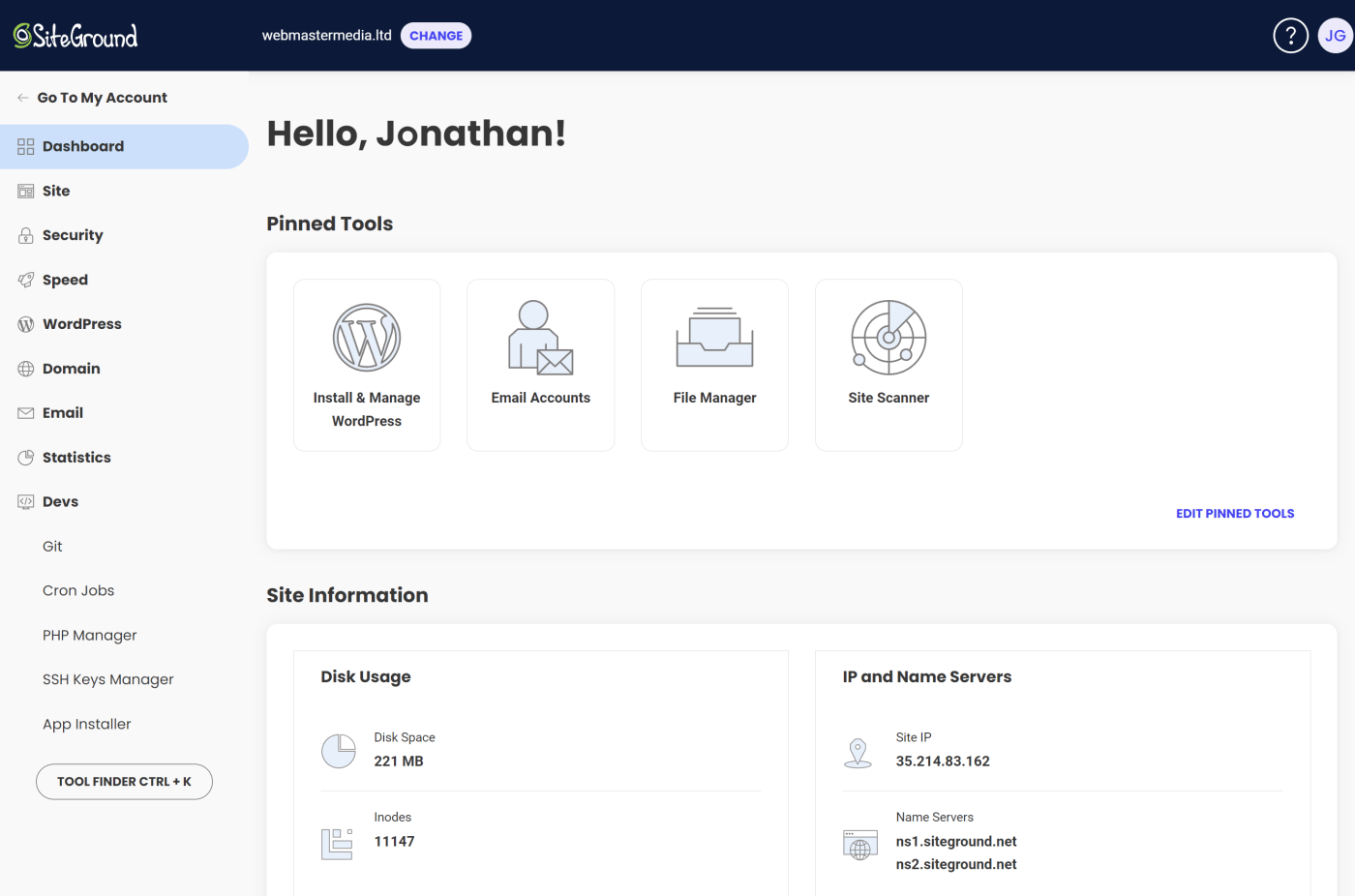
Both SiteGround and Liquid Web offer migration services for websites, but their approaches and costs differ. SiteGround provides multiple affordable and helpful migration tools, including a free WordPress Migrator plugin for easy site transfers. Professional migration services are available for more complex needs at a fee of $30 per site. Liquid Web also assists with site migrations, providing robust support for moving sites, stores, or applications to their platform. This service usually involves manual assistance and is commonly free, although the scope and details might vary, making SiteGround’s more transparent pricing a notable advantage.
SiteGround’s help center is excellent with extensive articles, pinned help, and 24/7 live support through chat, phone, and helpdesk tickets. They offer quick and automated solutions based on user inquiries. Liquid Web also excels with an industry-leading knowledge base featuring many articles, tutorials, and resources updated frequently. They guarantee response times of 59 seconds for phone and chat and 59 minutes for helpdesk tickets.
User management
accessibility.
Score Components:
- Role customization (40%): Flexibility in creating and defining user roles and
permissions. - Ease of management (30%): User interface and tools for managing users.
- Access control (20%): Effectiveness of access control measures for different user
levels. - Scalability (10%): Ability to manage a growing number of users efficiently.
 8.4
8.4
 8.3
8.3
🏆 Winner SiteGround: Offers more versatile user management and branding control for clients with a focus on custom roles and white-label access.
SiteGround and Liquid Web both provide robust user management features, but SiteGround offers slightly more flexibility. SiteGround allows users to create custom roles, giving them control over which tools clients can access—a feature that’s particularly useful for those managing multiple clients. Liquid Web, through its Plesk control panel, offers predefined roles such as Administrator, Webmaster, Application User, and Accountant, which cover a broad range of permissions but lack the customization SiteGround provides. Meanwhile, users on higher-tier SiteGround plans, like GoGeek and Cloud, can create white-label clients who won’t see the SiteGround branding, offering a cleaner, professional presentation for client management.
Both hosting providers have intuitive interfaces for managing users. SiteGround’s user management is located within the Client Area, making it more accessible for business owners managing teams or clients. This area allows for easy role creation, user management, and setting login details for collaborators and clients. Liquid Web’s Plesk interface offers a User Accounts page accessible under different views (Service Provider or Power User), providing an organized layout where administrators can manage roles, create new users, and assign permissions efficiently. Plesk’s interface is comprehensive but may seem more complex for those unfamiliar with its layout.
In terms of access control and scalability, both SiteGround and Liquid Web efficiently manage a growing number of users. SiteGround’s ability to assign tailored roles and provide white-label access grants business owners more control over access permissions, which is advantageous as the number of collaborators or clients increases. Liquid Web’s predefined roles simplify setup and user management, but the lack of customizability may limit nuanced access control for larger teams. Both platforms perform well under increased user load, though SiteGround’s detailed role management offers a slight edge for complex organizational needs.
SiteGround User Roles Table:
| Role | Description | Access highlights |
|---|---|---|
| Custom Role | Allows creation of tailored client roles with specific tool access. | Select customizable permissions for various site tools. |
Liquid Web User Roles Table:
| Role | Description | Access highlights |
|---|---|---|
| Administrator | Full access to Plesk control panel and server management functions. | Can manage all services and settings within Plesk. |
| Webmaster | Manages most aspects of subscriptions and site configurations. | Cannot create new Plesk users or manage roles. |
| Application User | Limited access to specific applications and services. | Restricted to application-specific functionality. |
| Accountant | View details of subscriptions without making changes. | Read-only access to subscription details. |
Customer support
hosting provider.
Score Components:
- Support communication channels (30%): Measures the variety of customer support types
provided (live chat, chatbot, email, phone, etc.) - Availability (20%): Assesses the availability hours for each channel, including 24/7
support options. - Technical support quality (30%): Assesses whether the provider offers comprehensive
technical support, including hardware upgrades (e.g., HDD to SSD), software installations, and web
server configuration changes. - Enterprise support (20%): Checks if there are dedicated or priority support services
for enterprise-level customers.
 9.2
9.2
 9.4
9.4
🏆 Winner Liquid Web: Offers superior customer support with quick response times and extensive support features.
 |
 |
|
|---|---|---|
Phone support |
Yes |
Yes |
Live chat support |
Yes |
Yes |
Chatbot |
Yes |
No |
Email/ticket support |
Yes |
Yes |
Enterprise support (dedicated agent, priority) |
Yes |
Yes |
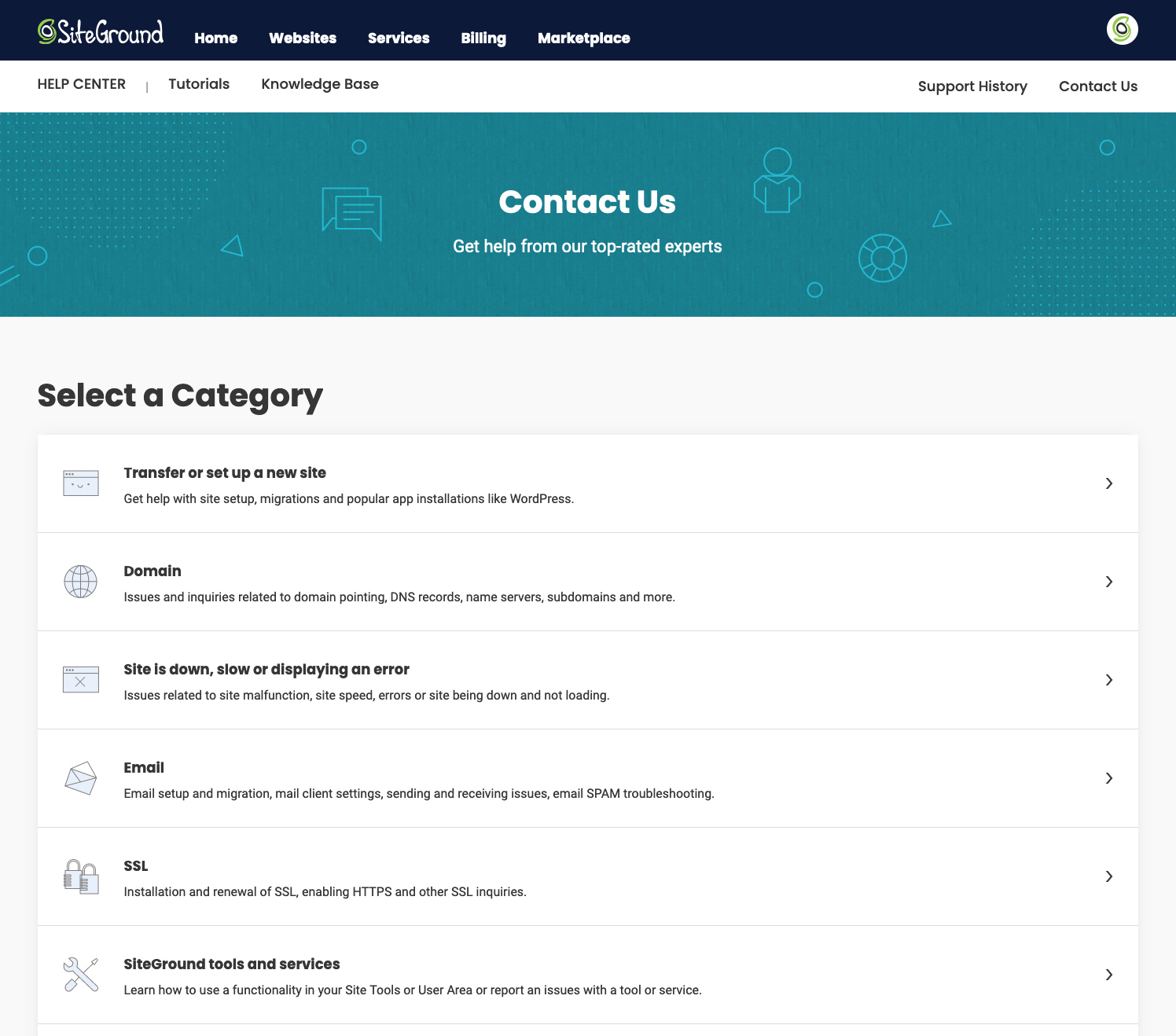
SiteGround and Liquid Web provide strong customer service with multiple support channels and specialized features. SiteGround distinguishes itself with a high customer satisfaction rate of 98%, offering a 24/7 support system that includes live chat, phone support, and a well-prepared helpdesk ticket system. They also have added features like AI assistance and professional expert migrations for a fee, alongside a significant focus on client empowerment.
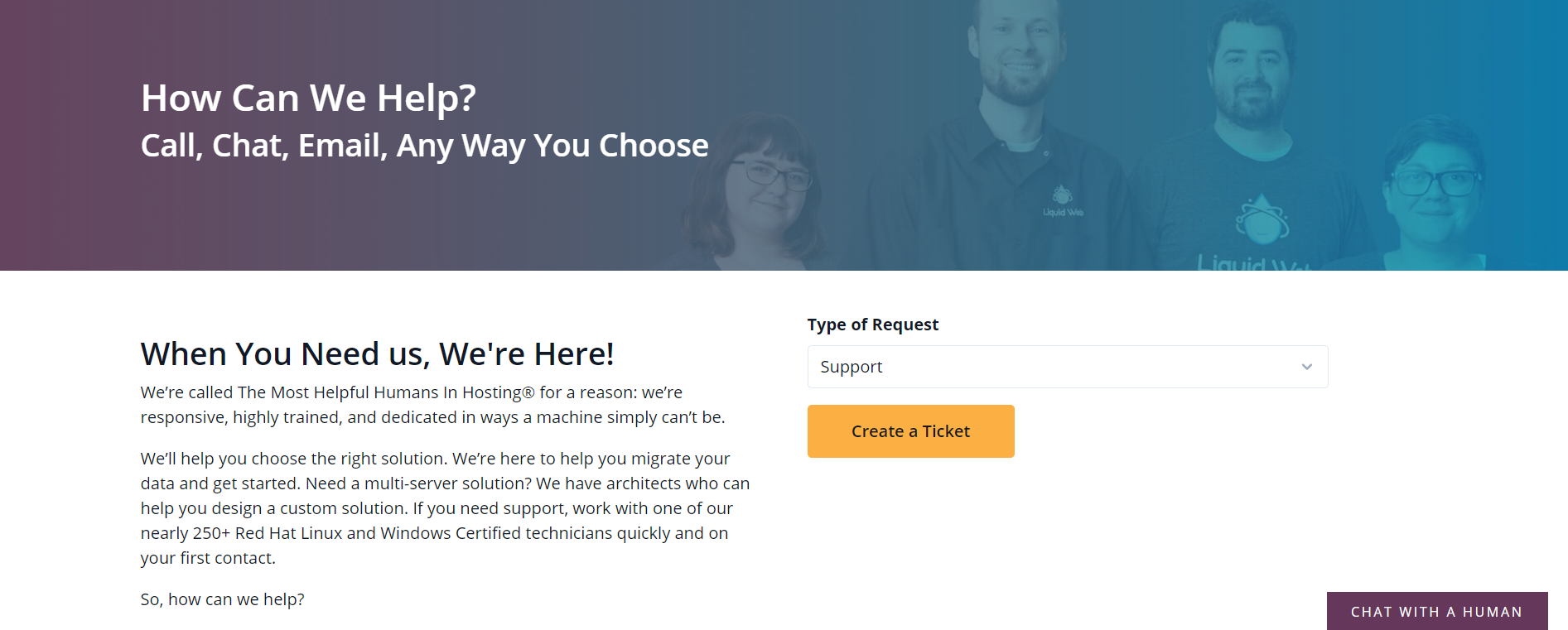
Liquid Web, on the other hand, excels with its Heroic Support® promise, offering multiple contact methods such as phone, chat, and helpdesk with rapid initial response guarantees—59 seconds for phone and chat and 59 minutes for helpdesk. They also have dedicated teams for different hosting needs, an extensive knowledge base, proactive monitoring, and custom solutions. Their high Net Promoter Score (NPS) of 67 indicates strong customer loyalty and satisfaction.
Siteground vs Liquid Web: User feedback
SiteGround garners consistently high praise for its exceptional customer support and user-friendly tools, frequently being described as reliable and straightforward to use. Users commend the fast and knowledgeable technical assistance, which is available through various channels like chat and phone, often highlighting the effectiveness and patience of support representatives. Despite these positive aspects, some users find renewal pricing relatively expensive and note that navigating to the support section can be cumbersome. Issues with specific features, such as webmail interface and certain plugins, are also mentioned, but overall, SiteGround is recommended for its strong support and ease of use, especially for beginners and small businesses.
Customer feedback for this hosting provider is mixed, with significant polarization in user experiences. While some have praised the company for its reliable uptime, exceptional support, and proactive monitoring, others have experienced severe dissatisfaction due to frequent downtimes, unresponsive customer service, and unethical billing practices. Long-term customers, in particular, have noted a sharp decline in service quality and support efficiency, attributing it to recent management changes. Despite positive reviews highlighting excellent technical support and overall reliability, a growing number of users advise against using this provider due to these negative aspects.
Siteground vs Liquid Web: FAQ
Which platform is better suited for hosting WordPress websites?
Both SiteGround and Liquid Web are well-suited for hosting WordPress websites, providing comprehensive tools and services tailored for WordPress users. While both platforms offer automatic updates and extensive support for WordPress, the choice may come down to specific requirements like budget, ease of use, and the level of technical support needed. Therefore, both platforms are effectively tied in this category, making either a viable option for WordPress hosting.
Are both platforms suitable for beginners?
SiteGround is particularly suitable for beginners due to its user-friendly tools and extensive customer support options, including live chat, phone support, and a robust helpdesk. Liquid Web is more geared toward users with advanced needs or technical expertise, as it offers more complex hosting solutions like VPS and dedicated servers. For beginners, SiteGround is the recommended choice due to its ease of use and accessible support.
Which hosting service offers better security features?
SiteGround features an AI Anti-Bot system, a smart Web Application Firewall (WAF), and daily distributed backups, making it robust in security measures. Liquid Web, on the other hand, offers real-time DDoS protection and an F5 AIP intrusion detection system along with full encryption and VPN support. While both platforms are strong in security, Liquid Web’s more advanced and comprehensive security measures may appeal more to enterprises and high-security needs.
What are the major differences in pricing and value between siteground and liquidweb?
SiteGround offers competitively priced plans with extensive features, such as free site builder, SSL, CDN, and daily backups, making it appealing for small to medium-sized businesses. Liquid Web, however, tends to be more expensive due to its focus on enterprise-level solutions with compliance and dedicated resources. SiteGround provides better initial discounts and more user-friendly enhancements, while Liquid Web’s higher cost reflects its advanced hosting capabilities.
Which platform offers better customer support?
SiteGround provides excellent customer support through multiple channels, including 24/7 live chat, phone support, and helpdesk tickets, achieving a high customer satisfaction rate. Liquid Web offers rapid response times through its Heroic Support® promise, with guaranteed initial responses of 59 seconds for phone and chat, and 59 minutes for helpdesk tickets. Both platforms are exceptional in customer support, but Liquid Web’s dedicated teams and quick response times may give it a slight edge.
The making of this blog
We followed a clear, step-by-step process to write and research this article.









